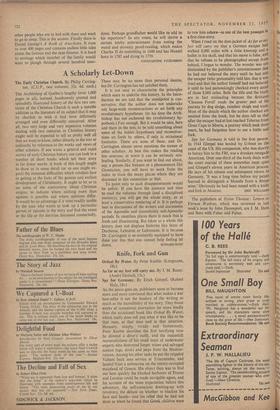Knife, Fork and Gun
As far as my feet will carry me. By J. M. Bauer. (Andre Deutsch, 15s.) As the peace goes on, publishers seem to become more and more convinced that what makes a war best-seller is not the honesty of the writing so much as the incredibility of the story. They boost works of sensational journalism far more loudly than the occasional book like Ordeal By Water, which really does tell you what it was like to be that man, at that time and in that situation. Honestly, simply, vividly and humorously, Peter Keeble describes the first terrifying time he donned a diver's outfit, and the makeshift resourcefulness of his small team of underwater experts who destroyed limpet mines and salvaged sunken tugs, docks and jeeps from the Mediter- ranean. Among his other tasks he put the crippled Valiant back into service at Trincomalee, and landed from a submarine on the enemy-occupied mainland of Greece. His object then was to find out how quickly the blocked harbours of Piraeus and Leontas could be made navigable again, and his account of the tense expectation before this adventure, the self-conscious dressing-up with revolvers, the debate on whether to blacken his face and hands—and his relief that he had not done so when he found that Greek children were to row him ashore—is one of the best passages in a first-class story.
When I read on the dust-jacket of As far as lily feet will carry me that a German escaper had walked 8,000 miles with a false kneecap and a bullet in his skull, and that his name is false, and that he refuses to be photographed except from behind, I began to Wonder. The wonder was nol diminished by the publisher's announcement that he had not believed the story until he had met the escaper (who presumably told him that it was true) and that the author himself had not believed it until he had painstakingly checked every detail of those 8,000 miles. Both the title and the blurb are in fact misleading because the fictitious 'Clemens Forell' made the greater part of his journey by dog sledge, reindeer sleigh and train. Most of the details which the author checked are omitted from the book, but he does tell us that after the escaper had at last reached Teheran from Great Cape in Siberia, a journey which took three years, he had forgotten how to use a knife and fork.
Spy for Germany is told in the first person. In 1944 Gimpel was landed by U-boat on the coast of the US. His companion, who was shortly to betray him to the FBI, was a drunken renegade American. Over one-third of the book deals with the court martial of these somewhat inept spies and Gimpel's eleven years in American prisons. He says of his release and subsequent return to Germany, 'It was a long time before my palate learned to distinguish a Moselle from a Rhine wine.' Obviously he had been issued with a knife










































































 Previous page
Previous page